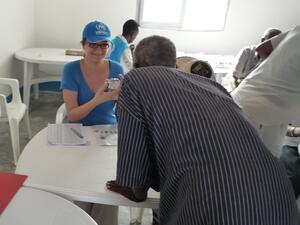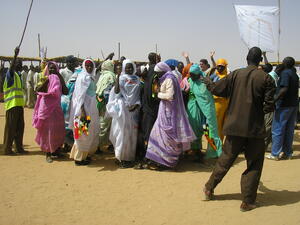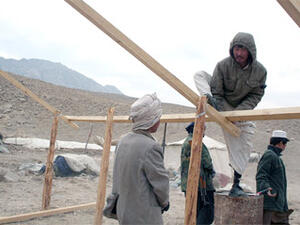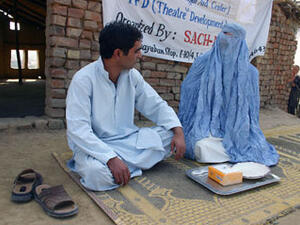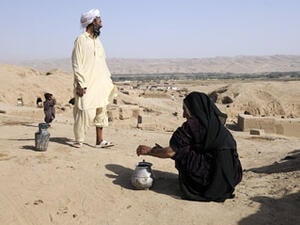UNHCR and Pakistan government sign Letter of Mutual Intent
UNHCR and Pakistan government sign Letter of Mutual Intent
UNHCR and the Pakistan government today signed a letter of intent to allow registered Afghans to extend their stay in the country until the end of 2012.
Minister of State and Frontier Regions (SAFRON) Najamuddin Khan and UNHCR Representative Guenet Guebre-Christos signed the Letter of Mutual Intent. It builds upon previous agreements within a tripartite framework between UNHCR and the governments of Pakistan and Afghanistan about the temporary stay of registered Afghans in Pakistan, their gradual and voluntary repatriation, and support from the international community to Pakistan for hosting one of the largest refugee populations in the world.
The letter states that the Ministry of States and Frontier Regions, Government of Pakistan, will undertake measures to extend the validity of the "Proof of Registration" (PoR) cards issued to Afghan citizens living in Pakistan until the end of 2012; review and approve, at the Cabinet level, a revised strategy for the management of Afghans living in Pakistan beyond 2009; and support the extension of the current Tripartite Agreement between the Governments of Pakistan, Afghanistan and UNHCR until the end of 2012.
The letter also states that UNHCR will continue to support voluntary, safe, dignified and gradual repatriation of Afghans from Pakistan. UNHCR will also actively engage the international community to fund the US $140 million Refugee-Affected and Hosting Areas (RAHA) programme over five years. RAHA will benefit Pakistanis and Afghans through development projects in rural regions most affected by the presence of Afghans and through health, education and water and sanitation improvements to communities that continue to host Afghan refugees in urban and rural areas. UNHCR will also continue to raise funds to support the Registration Information Project of Afghan Citizens to improve the quality of registration data, and update and correct proof of registration cards so that information about the Afghan population is current.
Today's agreement follows the 16th Tripartite Commission meeting held in Islamabad on 29 August 2008, which acknowledged that future planning for the voluntary return of registered Afghans should reflect reintegration challenges and ground realities in Afghanistan.
There are currently 1.7 million registered Afghans in Pakistan residing in refugee villages or scattered among host communities.
The RAHA programme will be implemented in 21 districts of Pakistan, mostly in the provinces of Balochistan and North West Frontier Province, and six urban areas of Sindh and Punjab, which have hosted the most number of Afghans. The programme, to be convened by UNHCR and UNDP, will improve social cohesion and local economies through community development and helping people to rebuild their livelihoods. For example, projects will focus on boosting employment prospects, reviving agricultural and irrigation systems, repairing farm to market roads, improving crop and livestock production, and marketing produce.
Other aspects of the programme will improve primary and secondary schools, boost health facilities and services, and increase access to safe drinking water. In those areas where the environment has been affected by the hosting of large refugee populations, projects will be designed to restore natural forest cover, rehabilitate degraded rangelands and watersheds and improve animal habitats.

